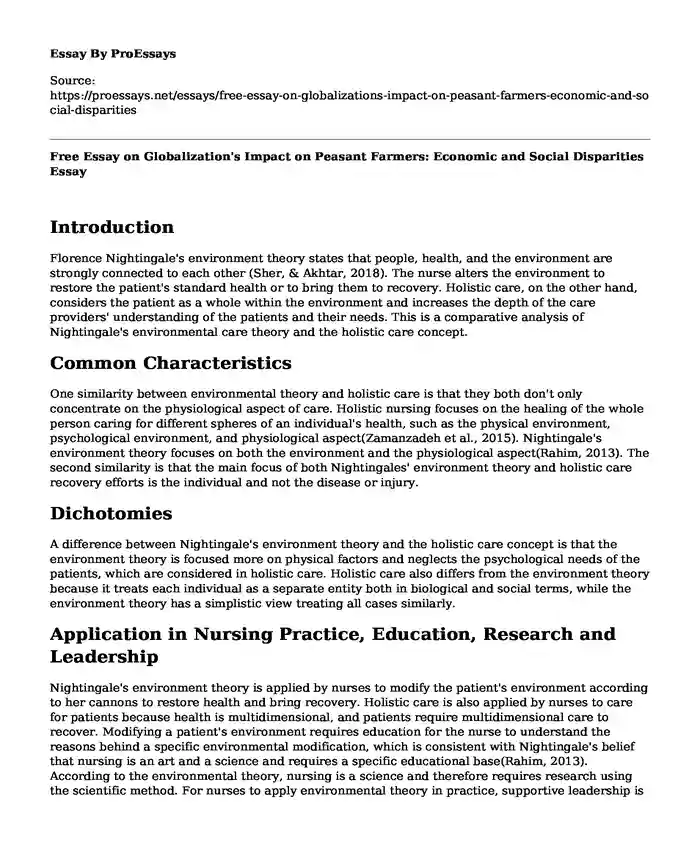Introduction
Florence Nightingale's environment theory states that people, health, and the environment are strongly connected to each other (Sher, & Akhtar, 2018). The nurse alters the environment to restore the patient's standard health or to bring them to recovery. Holistic care, on the other hand, considers the patient as a whole within the environment and increases the depth of the care providers' understanding of the patients and their needs. This is a comparative analysis of Nightingale's environmental care theory and the holistic care concept.
Common Characteristics
One similarity between environmental theory and holistic care is that they both don't only concentrate on the physiological aspect of care. Holistic nursing focuses on the healing of the whole person caring for different spheres of an individual's health, such as the physical environment, psychological environment, and physiological aspect(Zamanzadeh et al., 2015). Nightingale's environment theory focuses on both the environment and the physiological aspect(Rahim, 2013). The second similarity is that the main focus of both Nightingales' environment theory and holistic care recovery efforts is the individual and not the disease or injury.
Dichotomies
A difference between Nightingale's environment theory and the holistic care concept is that the environment theory is focused more on physical factors and neglects the psychological needs of the patients, which are considered in holistic care. Holistic care also differs from the environment theory because it treats each individual as a separate entity both in biological and social terms, while the environment theory has a simplistic view treating all cases similarly.
Application in Nursing Practice, Education, Research and Leadership
Nightingale's environment theory is applied by nurses to modify the patient's environment according to her cannons to restore health and bring recovery. Holistic care is also applied by nurses to care for patients because health is multidimensional, and patients require multidimensional care to recover. Modifying a patient's environment requires education for the nurse to understand the reasons behind a specific environmental modification, which is consistent with Nightingale's belief that nursing is an art and a science and requires a specific educational base(Rahim, 2013). According to the environmental theory, nursing is a science and therefore requires research using the scientific method. For nurses to apply environmental theory in practice, supportive leadership is needed to motivate and make sure the necessary resources are available.
References
Rahim, S. (2013). Clinical application of Nightingale's environmental theory. i-manager's Journal on Nursing, 3(1), 43.
Sher, A. N. A., & Akhtar, A. (2018). Clinical application of Nightingale's theory. Journal of Clinical Research and Bioethics, 9(329), 2.
Zamanzadeh, V., Jasemi, M., Valizadeh, L., Keogh, B., & Taleghani, F. (2015). Effective factors in providing holistic care: a qualitative study. Indian journal of palliative care, 21(2), 214.
Cite this page
Free Essay on Globalization's Impact on Peasant Farmers: Economic and Social Disparities. (2023, Dec 31). Retrieved from https://proessays.net/essays/free-essay-on-globalizations-impact-on-peasant-farmers-economic-and-social-disparities
If you are the original author of this essay and no longer wish to have it published on the ProEssays website, please click below to request its removal:
- Serving the World's Poor, Profitably Article Review
- Reflection Essay on Youth Unemployment
- Financial Crisis 2008/9 Essay Example
- Essay Sample on Corporate Policies
- Understanding Independent Contractors: A Legal Analysis - Research Paper
- New Employees Can't Write: Exploring Solutions With John Warner - Essay Sample
- Paper Example on Minimum Wage: Protecting Workers from Unfair Pay







